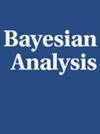具有难以处理的归一化常数的指数族似然的扭曲梯度增强高斯过程代理模型
IF 2.5
2区 数学
Q1 MATHEMATICS, INTERDISCIPLINARY APPLICATIONS
引用次数: 0
摘要
对于具有难以处理的归一化常数的指数族模型的马尔可夫链蒙特卡罗方法,如交换算法,需要在马尔可夫链的每次迭代中模拟足够的统计量,这往往导致昂贵的计算。已经开发了似然函数的代理模型来加速这种情况下的推理算法。然而,这些替代模型往往相对不灵活,并且通常提供对真实似然函数的较差近似值。在本文中,我们提出使用一个扭曲的、梯度增强的、高斯过程的似然函数代理模型,该模型联合建模充分统计量的样本均值和方差,并使用扭曲函数来捕获输入参数空间中的协方差非平稳性。我们表明,在进行推理时,可以利用非平稳性和梯度信息的考虑来获得优于传统平稳高斯过程代理模型的代理模型,特别是在似然函数显示相变的区域。我们还表明,当嵌入精确的推理算法时,所提出的代理模型可以用于提高单位时间内的有效样本量。我们的方法在加速推理算法方面的效用在模拟和现实世界的数据上得到了证明。本文章由计算机程序翻译,如有差异,请以英文原文为准。
Warped Gradient-Enhanced Gaussian Process Surrogate Models for Exponential Family Likelihoods with Intractable Normalizing Constants
Markov chain Monte Carlo methods for exponential family models with intractable normalizing constant, such as the exchange algorithm, require simulations of the sufficient statistics at every iteration of the Markov chain, which often result in expensive computations. Surrogate models for the likelihood function have been developed to accelerate inference algorithms in this context. However, these surrogate models tend to be relatively inflexible, and often provide a poor approximation to the true likelihood function. In this article, we propose the use of a warped, gradient-enhanced, Gaussian process surrogate model for the likelihood function, which jointly models the sample means and variances of the sufficient statistics, and uses warping functions to capture covariance nonstationarity in the input parameter space. We show that both the consideration of nonstationarity and the inclusion of gradient information can be leveraged to obtain a surrogate model that outperforms the conventional stationary Gaussian process surrogate model when making inference, particularly in regions where the likelihood function exhibits a phase transition. We also show that the proposed surrogate model can be used to improve the effective sample size per unit time when embedded in exact inferential algorithms. The utility of our approach in speeding up inferential algorithms is demonstrated on simulated and real-world data.
求助全文
通过发布文献求助,成功后即可免费获取论文全文。
去求助
来源期刊

Bayesian Analysis
数学-数学跨学科应用
CiteScore
6.50
自引率
13.60%
发文量
59
审稿时长
>12 weeks
期刊介绍:
Bayesian Analysis is an electronic journal of the International Society for Bayesian Analysis. It seeks to publish a wide range of articles that demonstrate or discuss Bayesian methods in some theoretical or applied context. The journal welcomes submissions involving presentation of new computational and statistical methods; critical reviews and discussions of existing approaches; historical perspectives; description of important scientific or policy application areas; case studies; and methods for experimental design, data collection, data sharing, or data mining.
Evaluation of submissions is based on importance of content and effectiveness of communication. Discussion papers are typically chosen by the Editor in Chief, or suggested by an Editor, among the regular submissions. In addition, the Journal encourages individual authors to submit manuscripts for consideration as discussion papers.
 求助内容:
求助内容: 应助结果提醒方式:
应助结果提醒方式:


